- Home
- H. Rider Haggard
Child of Storm Page 16
Child of Storm Read online
Page 16
"You will be comfortable here, Macumazahn," said Maputa, "during your stay, which we hope will be long, since, although there will soon be a mighty crowd at Nodwengu, the King has given orders that none except your own servants are to enter this valley."
"I thank the King; but why will there be a crowd, Maputa?"
"Oh!" he answered with a shrug of the shoulders, "because of a new thing. All the tribes of the Zulus are to come up to be reviewed. Some say that Cetewayo has brought this about, and some say that it is Umbelazi. But I am sure that it is the work of neither of these, but of Saduko, your old friend, though what his object is I cannot tell you. I only trust," he added uneasily, "that it will not end in bloodshed between the Great Brothers."
"So Saduko has grown tall, Maputa?"
"Tall as a tree, Macumazahn. His whisper in the King's ear is louder than the shouts of others. Moreover, he has become a 'self-eater' [that is a Zulu term which means one who is very haughty]. You will have to wait on him, Macumazahn; he will not wait on you."
"Is it so?" I answered. "Well, tall trees are blown down sometimes."
He nodded his wise old head. "Yes, Macumazahn; I have seen plenty grow and fall in my time, for at last the swimmer goes with the stream. Anyhow, you will be able to do a good trade among so many, and, whatever happens, none will harm you whom all love. And now farewell; I bear your messages to the King, who sends an ox for you to kill lest you should grow hungry in his house."
That same evening I saw Saduko and the others, as I shall tell. I had been up to visit the King and give him my present, a case of English table-knives with bone handles, which pleased him greatly, although he did not in the least know how to use them. Indeed, without their accompanying forks these are somewhat futile articles. I found the old fellow very tired and anxious, but as he was surrounded by indunas, I had no private talk with him. Seeing that he was busy, I took my leave as soon as I could, and when I walked away whom should I meet but Saduko.
I saw him while he was a good way off, advancing towards the inner gate with a train of attendants like a royal personage, and knew very well that he saw me. Making up my mind what to do at once, I walked straight on to him, forcing him to give me the path, which he did not wish to do before so many people, and brushed past him as though he were a stranger. As I expected, this treatment had the desired effect, for after we had passed each other he turned and said:
"Do you not know me, Macumazahn?"
"Who calls?" I asked. "Why, friend, your face is familiar to me. How are you named?"
"Have you forgotten Saduko?" he said in a pained voice.
"No, no, of course not," I answered. "I know you now, although you seem somewhat changed since we went out hunting and fighting together—I suppose because you are fatter. I trust that you are well, Saduko? Good-bye. I must be going back to my wagons. If you wish to see me you will find me there."
These remarks, I may add, seemed to take Saduko very much aback. At any rate, he found no reply to them, even when old Maputa, with whom I was walking, and some others sniggered aloud. There is nothing that Zulus enjoy so much as seeing one whom they consider an upstart set in his place.
Well, a couple of hours afterwards, just as the sun was sinking, who should walk up to my wagons but Saduko himself, accompanied by a woman whom I recognised at once as his wife, the Princess Nandie, who carried a fine baby boy in her arms. Rising, I saluted Nandie and offered her my camp-stool, which she looked at suspiciously and declined, preferring to seat herself on the ground after the native fashion. So I took it back again, and after I had sat down on it, not before, stretched out my hand to Saduko, who by this time was quite humble and polite.
Well, we talked away, and by degrees, without seeming too much interested in them, I was furnished with a list of all the advancements which it had pleased Panda to heap upon Saduko during the past year. In their way they were remarkable enough, for it was much as though some penniless country gentleman in England had been promoted in that short space of time to be one of the premier peers of the kingdom and endowed with great offices and estates. When he had finished the count of them he paused, evidently waiting for me to congratulate him. But all I said was:
"By the Heavens above I am sorry for you, Saduko! How many enemies you must have made! What a long way there will be for you to fall one night!"—a remark at which the quiet Nandie broke into a low laugh that I think pleased her husband even less than my sarcasm. "Well," I went on, "I see that you have got a baby, which is much better than all these titles. May I look at it, Inkosazana?"
Of course she was delighted, and we proceeded to inspect the baby, which evidently she loved more than anything on earth. Whilst we were examining the child and chatting about it, Saduko sitting by meanwhile in the sulks, who on earth should appear but Mameena and her fat and sullen-looking husband, the chief Masapo.
"Oh, Macumazahn," she said, appearing to notice no one else, "how pleased I am to see you after a whole long year!"
I stared at her and my jaw dropped. Then I recovered myself, thinking she must have made a mistake and meant to say "week."
"Twelve moons," she went on, "and, Macumazahn, not one of them has gone by but I have thought of you several times and wondered if we should ever meet again. Where have you been all this while?"
"In many places," I answered; "amongst others at the Black Kloof, where I called upon the dwarf, Zikali, and lost my looking-glass."
"The Nyanga, Zikali! Oh, how often have I wished to see him. But, of course, I cannot, for I am told he will not receive any women."
"I don't know, I am sure," I replied, "but you might try; perhaps he would make an exception in your favour."
"I think I will, Macumazahn," she murmured, whereon I collapsed into silence, feeling that things were getting beyond me.
When I recovered myself a little it was to hear Mameena greeting Saduko with much effusion, and complimenting him on his rise in life, which she said she had always foreseen. This remark seemed to bowl out Saduko also, for he made no answer to it, although I noticed that he could not take his eyes off Mameena's beautiful face. Presently, however, he seemed to become aware of Masapo, and instantly his whole demeanour changed, for it grew proud and even terrible. Masapo tendered him some greeting; whereon Saduko turned upon him and said:
"What, chief of the Amasomi, do you give the good-day to an umfokazana and a mangy hyena? Why do you do this? Is it because the low umfokazana has become a noble and the mangy hyena has put on a tiger's coat?" And he glared at him like a veritable tiger.
Masapo made no answer that I could catch. Muttering some inaudible words, he turned to depart, and in doing so—quite innocently, I think—struck Nandie, knocking her over on to her back and causing the child to fall out of her arms in such fashion that its tender head struck against a pebble with sufficient force to cause it to bleed.
Saduko leapt at him, smiting him across the shoulders with the little stick that he carried. For a moment Masapo paused, and I thought that he was going to show fight. If he had any such intention, however, he changed his mind, for without a word, or showing any resentment at the insult which he had received, he broke into a heavy run and vanished among the evening shadows. Mameena, who had observed all, broke into something else, namely, a laugh.
"Piff! My husband is big yet not brave," she said, "but I do not think he meant to hurt you, woman."
"Do you speak to me, wife of Masapo?" asked Nandie with gentle dignity, as she gained her feet and picked up the stunned child. "If so, my name and titles are the Inkosazana Nandie, daughter of the Black One and wife of the lord Saduko."
"Your pardon," replied Mameena humbly, for she was cowed at once. "I did not know who you were, Inkosazana."
"It is granted, wife of Masapo. Macumazahn, give me water, I pray you, that I may bathe the head of my child."
The water was brought, and presently, when the little one seemed all right again, for it had only received a scratch, Nandie thanked m
e and departed to her own huts, saying with a smile to her husband as she passed that there was no need for him to accompany her, as she had servants waiting at the kraal gate. So Saduko stayed behind, and Mameena stayed also. He talked with me for quite a long while, for he had much to tell me, although all the time I felt that his heart was not in his talk. His heart was with Mameena, who sat there and smiled continually in her mysterious way, only putting in a word now and again, as though to excuse her presence.
At length she rose and said with a sigh that she must be going back to where the Amasomi were in camp, as Masapo would need her to see to his food. By now it was quite dark, although I remember that from time to time the sky was lit up by sheet lightning, for a storm was brewing. As I expected, Saduko rose also, saying that he would see me on the morrow, and went away with Mameena, walking like one who dreams.
A few minutes later I had occasion to leave the wagons in order to inspect one of the oxen which was tied up by itself at a distance, because it had shown signs of some sickness that might or might not be catching. Moving quietly, as I always do from a hunter's habit, I walked alone to the place where the beast was tethered behind some mimosa thorns. Just as I reached these thorns the broad lightning shone out vividly, and showed me Saduko holding the unresisting shape of Mameena in his arms and kissing her passionately.
Then I turned and went back to the wagons even more quietly than I had come.
I should add that on the morrow I found out that, after all, there was nothing serious the matter with my ox.
CHAPTER X
THE SMELLING-OUT
After these events matters went on quietly for some time. I visited Saduko's huts—very fine huts—about the doors of which sat quite a number of his tribesmen, who seemed glad to see me again. Here I learned from the Lady Nandie that her babe, whom she loved dearly, was none the worse for its little accident. Also I learned from Saduko himself, who came in before I left, attended like a prince by several notable men, that he had made up his quarrel with Masapo, and, indeed, apologised to him, as he found that he had not really meant to insult the princess, his wife, having only thrust her over by accident. Saduko added indeed that now they were good friends, which was well for Masapo, a man whom the King had no cause to like. I said that I was glad to hear it, and went on to call upon Masapo, who received me with enthusiasm, as also did Mameena.
Here I noted with pleasure that this pair seemed to be on much better terms than I understood had been the case in the past, for Mameena even addressed her husband on two separate occasions in very affectionate language, and fetched something that he wanted without waiting to be asked. Masapo, too, was in excellent spirits, because, as he told me, the old quarrel between him and Saduko was thoroughly made up, their reconciliation having been sealed by an interchange of gifts. He added that he was very glad that this was the case, since Saduko was now one of the most powerful men in the country, who could harm him much if he chose, especially as some secret enemy had put it about of late that he, Masapo, was an enemy of the King's House, and an evil-doer who practised witchcraft. In proof of his new friendship, however, Saduko had promised that these slanders should be looked into and their originator punished, if he or she could be found.
Well, I congratulated him and took my departure, "thinking furiously," as the Frenchman says. That there was a tragedy pending I was sure; this weather was too calm to last; the water ran so still because it was preparing to leap down some hidden precipice.
Yet what could I do? Tell Masapo I had seen his wife being embraced by another man? Surely that was not my business; it was Masapo's business to attend to her conduct. Also they would both deny it, and I had no witness. Tell him that Saduko's reconciliation with him was not sincere, and that he had better look to himself? How did I know it was not sincere? It might suit Saduko's book to make friends with Masapo, and if I interfered I should only make enemies and be called a liar who was working for some secret end.
Go to Panda and confide my suspicions to him? He was far too anxious and busy about great matters to listen to me, and if he did, would only laugh at this tale of a petty flirtation. No, there was nothing to be done except sit still and wait. Very possibly I was mistaken, after all, and things would smooth themselves out, as they generally do.
Meanwhile the "reviewing," or whatever it may have been, was in progress, and I was busy with my own affairs, making hay while the sun shone. So great were the crowds of people who came up to Nodwengu that in a week I had sold everything I had to sell in the two wagons, that were mostly laden with cloth, beads, knives and so forth. Moreover, the prices I got were splendid, since the buyers bid against each other, and before I was cleared out I had collected quite a herd of cattle, also a quantity of ivory. These I sent on to Natal with one of the wagons, remaining behind myself with the other, partly because Panda asked me to do so—for now and again he would seek my advice on sundry questions—and partly from curiosity.
There was plenty to be curious about up at Nodwengu just then, since no one was sure that civil war would not break out between the princes Cetewayo and Umbelazi, whose factions were present in force.
It was averted for the time, however, by Umbelazi keeping away from the great gathering under pretext of being sick, and leaving Saduko and some others to watch his interests. Also the rival regiments were not allowed to approach the town at the same time. So that public cloud passed over, to the enormous relief of everyone, especially of Panda the King. As to the private cloud whereof this history tells, it was otherwise.
As the tribes came up to the Great Place they were reviewed and sent away, since it was impossible to feed so vast a multitude as would have collected had they all remained. Thus the Amasomi, a small people who were amongst the first to arrive, soon left. Only, for some reason which I never quite understood, Masapo, Mameena and a few of Masapo's children and headmen were detained there; though perhaps, if she had chosen, Mameena could have given an explanation.
Well, things began to happen. Sundry personages were taken ill, and some of them died suddenly; and soon it was noted that all these people either lived near to where Masapo's family was lodged or had at some time or other been on bad terms with him. Thus Saduko himself was taken ill, or said he was; at any rate, he vanished from public gaze for three days, and reappeared looking very sorry for himself, though I could not observe that he had lost strength or weight. These catastrophes I pass over, however, in order to come to the greatest of them, which is one of the turning points of this chronicle.
After recovering from his alleged sickness Saduko gave a kind of thanksgiving feast, at which several oxen were killed. I was present at this feast, or rather at the last part of it, for I only put in what may be called a complimentary appearance, having no taste for such native gorgings. As it drew near its close Saduko sent for Nandie, who at first refused to come as there were no women present—I think because he wished to show his friends that he had a princess of the royal blood for his wife, who had borne him a son that one day would be great in the land. For Saduko, as I have said, had become a "self-eater," and this day his pride was inflamed by the adulation of the company and by the beer that he had drunk.
At length Nandie did come, carrying her babe, from which she never would be parted. In her dignified, ladylike fashion (although it seems an odd term to apply to a savage, I know none that describes her better) she greeted first me and then sundry of the other guests, saying a few words to each of them. At length she came opposite to Masapo, who had dined not wisely but too well, and to him, out of her natural courtesy, spoke rather longer than to the others, inquiring after his wife, Mameena, and others. At the moment it occurred to me that she did this in order to assure him that she bore no malice because of the accident of a while before, and was a party to her husband's reconciliation with him.
Masapo, in a hazy way, tried to reciprocate these kind intentions. Rising to his feet, his fat, coarse body swaying to and fro because of the beer that
he had drunk, he expressed satisfaction at the feast that had been prepared in her house. Then, his eyes falling on the child, he began to declaim about its size and beauty, until he was stopped by the murmured protests of others, since among natives it is held to be not fortunate to praise a young child. Indeed, the person who does so is apt to be called an "umtakati", or bewitcher, who will bring evil upon its head, a word that I heard murmured by several near to me. Not satisfied with this serious breach of etiquette, the intoxicated Masapo snatched the infant from its mother's arms under pretext of looking for the hurt that had been caused to its brow when it fell to the ground at my camp, and finding none, proceeded to kiss it with his thick lips.
Nandie dragged it from him, saying:
"Would you bring death upon my son, O Chief of the Amasomi?"
Then, turning, she walked away from the feasters, upon whom there fell a certain hush.
Fearing lest something unpleasant should ensue, for I saw Saduko biting his lips with rage not unmixed with fear, and remembering Masapo's reputation as a wizard, I took advantage of this pause to bid a general good night to the company and retire to my camp.

 The Ivory Child
The Ivory Child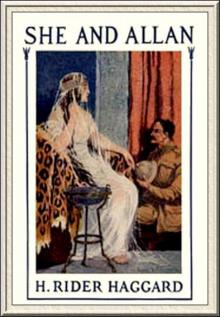 She and Allan
She and Allan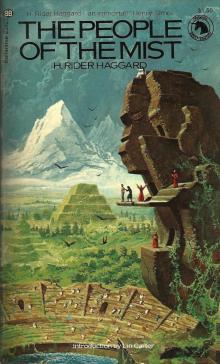 The People of the Mist
The People of the Mist She
She Morning Star
Morning Star King Solomon's Mines
King Solomon's Mines She: A History of Adventure
She: A History of Adventure Cleopatra
Cleopatra Ayesha, the Return of She
Ayesha, the Return of She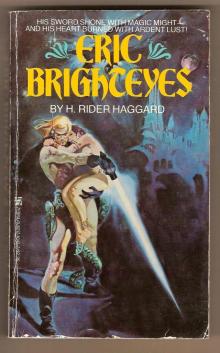 Eric Brighteyes
Eric Brighteyes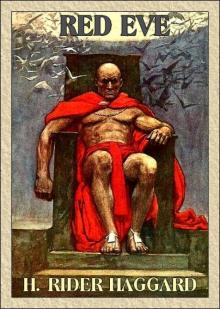 Red Eve
Red Eve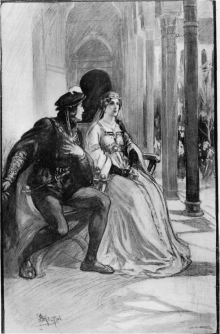 Fair Margaret
Fair Margaret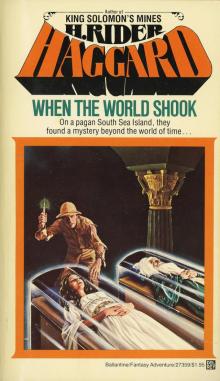 When the World Shook
When the World Shook Lysbeth, a Tale of the Dutch
Lysbeth, a Tale of the Dutch Moon of Israel: A Tale of the Exodus
Moon of Israel: A Tale of the Exodus Long Odds
Long Odds The Ghost Kings
The Ghost Kings Pearl-Maiden: A Tale of the Fall of Jerusalem
Pearl-Maiden: A Tale of the Fall of Jerusalem Allan and the Holy Flower
Allan and the Holy Flower Smith and the Pharaohs, and other Tales
Smith and the Pharaohs, and other Tales The Wanderer's Necklace
The Wanderer's Necklace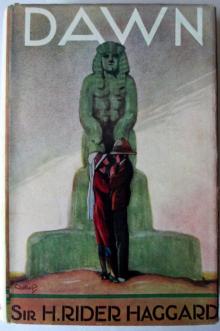 Dawn
Dawn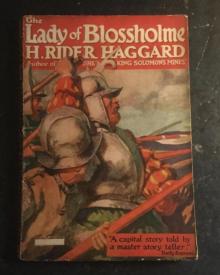 The Lady of Blossholme
The Lady of Blossholme Stella Fregelius: A Tale of Three Destinies
Stella Fregelius: A Tale of Three Destinies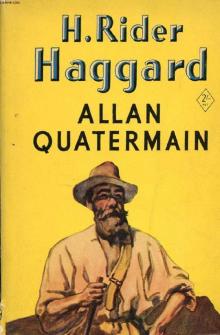 Allan Quatermain
Allan Quatermain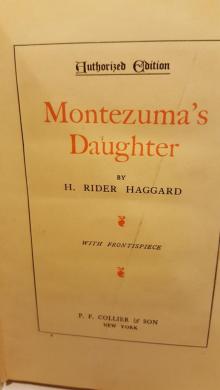 Montezuma's Daughter
Montezuma's Daughter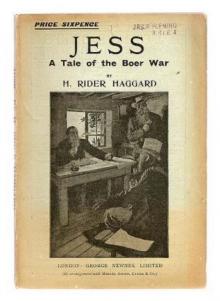 Jess
Jess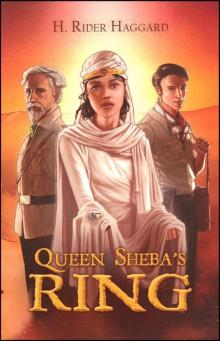 The Brethren
The Brethren Allan's Wife
Allan's Wife Child of Storm
Child of Storm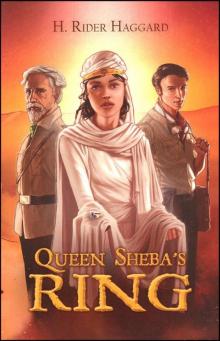 Queen Sheba's Ring
Queen Sheba's Ring King Solomon's Mines (Barnes & Noble Classics Series)
King Solomon's Mines (Barnes & Noble Classics Series)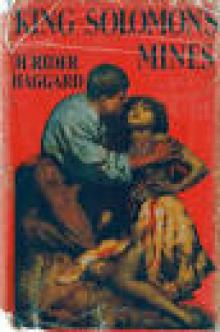 Complete Allan Quatermain Omnibus - Volumes 1 - 10
Complete Allan Quatermain Omnibus - Volumes 1 - 10